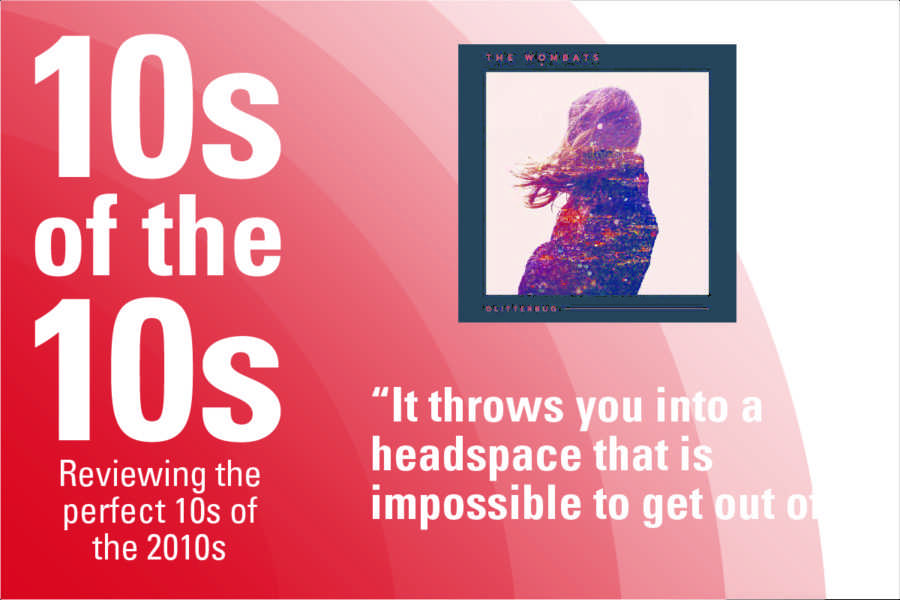10s of the 10s: The Wombats’ ‘Glitterbug’ paints a harsh picture of modern-day romance
10of10review template
December 8, 2019
In “Glitterbug,” The Wombats paint a bleak look into relationships in the modern technological age with grace, grit and a sparkle of synth.
“Glitterbug” is the fourth album of the indie-rock group, following up their second and break-out album “A Guide to Love, Loss and Desperation.” The three-man band’s tongue-in-cheek goofy tone decreases in “Glitterbug,” as their coming-of-age story through the eyes of lead singer and guitarist Matthew Murphy.
This album is more western-influenced compared to their previous endeavors. While the members of the band are always involved in producing their music, “Glitterbug” was made across continents.
“Especially on this album, a lot of the time Murph would be in Los Angeles and we would work on the backing track and send it over to him, then he’d go in the studio and work on it, then send it back,” said Dan Haggis, drummer for The Wombats in an interview with Ground Sounds. “It was a fun way and a new approach for us to work. The distance created the need for a new method.”
The band members worked heavily with Bastille producer Mark Crew on “Glitterbug,” and the British-indie-pop influence is evident within each track.
The album opens with “Emoticons,” a bittersweet introduction to the band’s thoughts on online dating and romance. It’s a yearning for honesty and open communication and wanting something that is so bad for you, as Murphy sings: “It’s tough to maintain focus baby/ Now all my elephants are in the room/ We crave the fiction when we need the truth/ You need to find a different boys to chew.” From the get-go, the song’s darker lyrics layered over almost haunting whistle tones indicate this album is taking a different turn.
The technological impact that can make-or-break a relationship is no stranger to Murphy’s lyrics, but this song takes a direct approach on criticism through the chorus. “And all these emoticons and words/ Try to make it better but they only make it worse.”
The bright synth in “Glitterbug” is often contrast to backhanded lyrics, creating a parody of modern pop-rock tunes. This peaks in the dance-centered “Pink Lemonade,” a song about a falsely sweetened relationship and seeing the world through rose-colored glasses. With biting lyrics such as “If you bring him home/ Can you use the spare bedroom,” it’s pretty much the the politest way to say “fuck you” Murphy could come up with.
“I need to keep moving to find inspiration,” Murphy said in an interview with NME about the track. “I went to Barcelona for a week and I’d just sit in a square and get drunk — the song ‘Pink Lemonade’ came from that. I just upped and fucked off and my girlfriend at the time, she went out and I had these ideas that she was fucking other people. I actually forced the paranoia…. Sometimes I purposefully fuck myself up to get a song out of it I suppose. I wouldn’t purposely fuck up a relationship but I do tend to say, ‘Right I’m gonna go away for a while now.’”
“Glitterbug” is filled with hazy, lo-fi production. Party tracks such as “Give Me A Try” seem commonplace with club pop songs about hookup culture and lust-centered romance, but other tracks such as “Greek Tragedy” reveal the darker emotions behind these romantic interactions that leaves the listener aching and reflecting on personal experiences. There is a sense of urgency that pushes you track by track until you are hit with a moment of crystal clarity starkly contrasting the muddled synth and guitar.
“Isabel” is a track almost exactly halfway through the album, offering a quiet break within the hazy madness with heart-clenching lyrics backed by simple guitar chords. The song has a simple production behind it, until almost the end where it’s just Murphy’s voice and a simple guitar track. His voice becomes increasingly synthesized and stylized. While “Isabel” is a moment to breathe within the heavier album, eventually you come down from the high, and the group throws you back into the madness.
Closing track “Flowerball” leaves the listener yearning for more, echoing Murphy’s desperate callings for answers within love. It’s a fitting end to an album dealing with questions about love, lust and modern-age romance. The main hook of the song is even based around a question, as Murphy sings: “How could you waltz through my bloodstream and then never call?” On an album so focused on only answering questions with more questions, leaving the album with even more unanswered questions about love and the future is an appropriate ending.
The Wombats add darker themes in “Glitterbug” to their humorous, often absurd songs from previous albums. This change doesn’t feel forced, but natural and relatable among their discography, as if the band is growing up and starting to rebel against itself. With fantastic synth and syncopated guitar, each song is catchier than the last and sticks with you after just one listen. It throws you into a headspace that is impossible to get out of — which is why this album is definitely one of the best of the 2010’s.
About 10s of the 10s: Limelight is looking back at the best albums of the 2010s. While streaming services and viral singles have slowly withered the impact of a full length release, the best albums of the 2010s pushed boundaries, inspired new sounds and spanned a range of genres. Each album in the series is independently selected by the reviewer.







